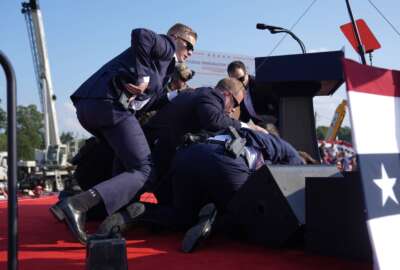Hubbard Radio Washington DC, LLC. All rights reserved. This website is not intended for users located within the European Economic Area.
A legend in the Senate, he may be the longest-serving federal employee
Legendary Senate staff member Bertie Bowman came to Washington in 1944 at the age of 13. At 90, he's still working as staff assistant to the Senate Foreign Rela...
Best listening experience is on Chrome, Firefox or Safari. Subscribe to Federal Drive’s daily audio interviews on Apple Podcasts or PodcastOne.
Wednesday evening, a ribbon-cutting ceremony formerly opened the Alexandria, Virginia headquarters of the Senate Federal Credit Union. The building is named for the legendary Senate staff member Bertie Bowman. He came to Washington in 1944, a runaway at the age of 13. At 90, he’s still working as staff assistant to the Senate Foreign Relations Committee. Just before the ceremonies, Federal Drive with Tom Temin got the chance to speak with Mr. Bowman.
Interview transcript:
Tom Temin: We know you have a long career as a Senate staffer, give us a rundown of the jobs you’ve done since, well, how many years ago was it?
Bertie Bowman: It would take me two years to do all of that.
Tom Temin: Well give us the highlights.
Bertie Bowman: Highlight is I was hearing coordinator for the Senate Foreign Relations Committee for many years, and the hearing coordinator also for the Credit Union Committee, Emeritus and all that.
Tom Temin: And what does a hearing coordinator do here and coordinate
Bertie Bowman: And hearing coordinator make sure that everybody’s work. And they meet and greets the people who are coming in to discuss things with the chairman of the committee or any staff member they may have an appointment with.
Tom Temin: But you’ve done a lot of other jobs prior to that, what are some of the ones that stand out in your mind?
Bertie Bowman: All of my jobs stand out in my mind, because if it wasn’t for all the jobs I’ve had, I probably wouldn’t be here talking to you today. But the one that I would say, the one that I’m really grateful of is that what the credit union has done for me and has helped me to grow into other jobs in the Senate.
Tom Temin: And I’ve seen footage of you, you set up the microphones, you make sure the witnesses get escorted. So you’ve had the elbow of some luminaries and some rogues, haven’t you?
Bertie Bowman: Yes, they are several people that I deal with before our hearing starts, I deal directly with the chairman of the committee, and I’ve had fun doing that.
Tom Temin: And when you’re setting up a hearing, it’s all set up, the witnesses are coming in, you’re kind of hanging there in the background, escort them in and out, making sure the microphones, the volumes and all that kind of stuff. I should get you as a producer in my studio one of these days. But do you listen to what’s going on?
Bertie Bowman: I’m too busy working trying to get the work done. I have others who helped me with the operation of setting up the Committee on Foreign Relations for the taping, for the hearings and the other senators of the committee.
Tom Temin: And how has the pandemic made all of this different? I won’t say more difficult because somehow I don’t think more difficult applies to you.
Bertie Bowman: I don’t know. I have not been to work for a while. Just kind of been under the weather for the last year almost. But it has been fun.
Tom Temin: And I understand that you’re not ready to actually retire.
Bertie Bowman: Not really. Never ready to retire. You never give up something that you enjoy doing.
Tom Temin: Now you came to Washington as a young man worked for the Senate – and what’s happened on your personal life in the meantime? Have you married, do you have kids, a family? We don’t see too much about that.
Bertie Bowman: Well, there is a family, two or three kids. There’s been a wife, my wife had passed, almost, I guess you can say I’m a widower now. I married twice. And my wife who kept the stick and kept me going.
Tom Temin: Alright, well, I would say to the people that might be listening that can’t see Mr. Bowman at the moment that this is a bright eyed, sharp looking guy.
Bertie Bowman: I feel good all the time that I spent working on the Hill, meeting people. And I think the folks that I’ve met and tried to help do certain things that have kept me alive and ready to roll every day.
Tom Temin: And all these years, of course, you’ve seen generations of young staff come, maybe stay, some come and go. A lot of them are sharp, they have a Yale degree or they have a Harvard degree and they’re going to change the world and reinvent the Senate. What’s that been like? And have you had a chance to maybe counsel some of them on how to conduct themselves?
Bertie Bowman: I’ve counseled many of them, and they do have these ideas of how they want to work or how they want to work for the senator or the senator that they are working for on Foreign Relations Committee. And they seem to do a pretty good job. They listen. I’ve learned a lot from them.
Tom Temin: And the senators themselves, lately we’ve seen a lot of this incivility and so forth that you see on television. What’s it like behind the scenes? Do they actually throw spitballs at each other?
Bertie Bowman: If spit balls are thrown, I do the throwing.
Tom Temin: But they used to have cigars together and they would have a bourbon together in a hidden room or something. Does that still happen? You don’t have to mention the bourbon. But, is there any kind of fellowship behind the scenes that the public doesn’t see?
Bertie Bowman: There’s always fellowship. And most of these fellowship that come my way are the ones that I tried to make sure that the senators, they have all the material that they need to do to hear and whatever they hear and maybe are the subject of the hearing, whatever it may be. And we go from there.
Tom Temin: And do you spend most of your time in the Senate office buildings, or do you get some time in the Capitol?
Bertie Bowman: I go from place to place. We have office in the Capitol, Senate Foreign Relations Committee office in the Capitol, and there are steps I do take to get that work done.
Tom Temin: Maybe you take the subway a little more often these days from building to building.
Bertie Bowman: Yeah, I don’t do that walking like I used to. I used to walk over run. And Senator Thurmond was the one that we always tried to get me, he always tried to get me to run with him. He used to run from building the building, but it was fun.
Tom Temin: Have you had any senators along the way that are particular favorites?
Bertie Bowman: The committee has 27, all of them were my favorites.
Tom Temin: You are a political man or politically wise man, you know how to traverse these fields pretty well. Let me ask you about the building itself, both the office building and the Capitol. You’ve probably dealt in this role with a lot of changing technology over the years and changing gadgets. What’s that been like? What are some of the changes you’ve seen?
Bertie Bowman: I’ve seen many changes. Although I had the privilege of being the hearing coordinator for the Senate Foreign Relations Committee. But there are other changes that have happened and I’ve seen happen.
Tom Temin: And of course, even the best Senate staffers don’t work 24 by seven, What do you do? What interests you when you’re off hours?
Bertie Bowman: I’ve never had any off hours. So I would work from the time I go there and the time I’m not there to the time I go back. There always work to do with the Senate Foreign Relations Committee.
Tom Temin: Tell us more about your relationship with Strom Thurmond.
Bertie Bowman: Strom Thurmond and I, we had a good relationship. He was of South Carolina. And a lot of people did not want him at the time when he became the Senator from South Carolina, but he ran and won. And we became good friends.
Tom Temin: Also having been in the District of Columbia all this time. I mean, that city has changed a lot in terms of racial relations, the way people interact with one another. That must be profound change looking back on a telescope.
Bertie Bowman: There have been a lot of changes, looking back on it. They were beautiful changes. Dealing with the Committee on Foreign Relations, whoever the chairman may be, or whatever, I had fun.
Tom Temin: Do you make your home in the district?
Bertie Bowman: I’m in the District of Columbia.
Tom Temin: My parents are both district natives, were Eastern High, prior to Capitol Hill, my dad, and my mother was in northwest at Theodore Roosevelt.
Bertie Bowman: I went to Roosevelt. I was trying to finish up for high school, because I was in school and then all of a sudden I went back to get my high school diploma.
Tom Temin: Yeah, that was the one was the pride of Capitol Hill, Roosevelt’s the pride of 13th Street, I guess you might say, right up the top there, just up the street from Central. I must be kind of astonishing to think about how for the better how much DC has changed.
Bertie Bowman: DC has changed quite a bit. And I’ve been along with the changes, and I accept them as they come.
Tom Temin: And I want to comment because again, people can’t see but, I said you’re bright eyed before. You also are looking me straight in the eye with a gaze, and having met the Clintons, the Thurmonds and all of these people parading through the Capitol all the years – I don’t think anyone intimidated you, did they?
Bertie Bowman: I never was intimidated by any of them. I was doing the work there and it was cleaning this stuff step by step, what I enjoyed doing,
Tom Temin: And so do you feel you might have left a little bit with them from you – even Bill Clinton, Hillary Clinton, those are people you’ve helped by the elbow too.
Bertie Bowman: I think I learned from what I was doing, and I had no problem with any of them. They were a joy. And once you meet Bertie Bowman, you won’t have to worry about anybody else.
Copyright © 2024 Federal News Network. All rights reserved. This website is not intended for users located within the European Economic Area.
Tom Temin
Tom Temin is host of the Federal Drive and has been providing insight on federal technology and management issues for more than 30 years.
Follow @tteminWFED
Related Stories
The Secret Service is investigating how a gunman who shot and injured Trump was able to get so close
Related Topics





